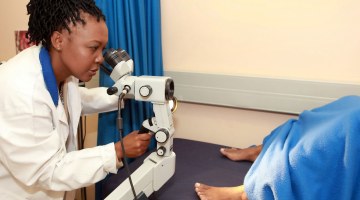via Lancet.com, by Salim S Abdool Karim and Quarraisha Abdool Karim
 On May 10, 2012, a US Food and Drug Administration (FDA) advisory committee voted in support of the use of tenofovir-emtricitabine for HIV prevention.1 If the FDA, which is scheduled to make its decision by June 15, adopts the committee's recommendations, tenofovir-emtricitabine will become the first antiretroviral drug to be approved as pre-exposure prophylaxis (PrEP) for the prevention of HIV, paving the way for implementation.
On May 10, 2012, a US Food and Drug Administration (FDA) advisory committee voted in support of the use of tenofovir-emtricitabine for HIV prevention.1 If the FDA, which is scheduled to make its decision by June 15, adopts the committee's recommendations, tenofovir-emtricitabine will become the first antiretroviral drug to be approved as pre-exposure prophylaxis (PrEP) for the prevention of HIV, paving the way for implementation.
However, there are several criticisms and concerns about PrEP. First, that data on the effectiveness of PrEP, especially in women, are inconsistent. This concern is based on the results of two PrEP studies—the FEM-PrEP2 and VOICE3, 4 trials—which were stopped, at least partly, earlier than planned when they did not show efficacy. To some extent, this concern has been allayed by recent data from the FEM-PrEP trial5 which show that adherence to daily tenofovir-emtricitabine in the trial was too low allow assessment of efficacy. Data to explain the VOICE trial, which still has an ongoing tenofovir-emtricitabine group, are not expected until 2013.
Second, some suggest that antiretroviral drugs should be provided to HIV-negative people only when all eligible HIV-positive patients are receiving ART. Although it is a legitimate concern that eligible HIV-positive patients should be prioritised for ART for their own health and to save their lives, it is spurious to trade off treatment and prevention as if these drugs are being taken away from sick and dying patients to be given to healthy people. Treatment and prevention strategies are a continuum in their use of antiretroviral drugs—both are needed in conjunction with each other to ensure ART provision is sustainable in the long term and to realise the quest to end the HIV epidemic.
Read the Rest.
-------------------
*Join IRMA's robust, highly-active. moderated, global listserv addressing rectal microbicide research and advocacy as well as other interesting new HIV prevention technologies by contacting us at rectalmicro@gmail.com. Joining our listserv automatically makes you a member of IRMA - a network of more than 1,100 advocates, scientists, policy makers and funders from all over the world.
*Also, please note that shared news items from other sources posted on this blog do not necessarily mean IRMA has taken any position on the article's content.
-------------------
 On May 10, 2012, a US Food and Drug Administration (FDA) advisory committee voted in support of the use of tenofovir-emtricitabine for HIV prevention.1 If the FDA, which is scheduled to make its decision by June 15, adopts the committee's recommendations, tenofovir-emtricitabine will become the first antiretroviral drug to be approved as pre-exposure prophylaxis (PrEP) for the prevention of HIV, paving the way for implementation.
On May 10, 2012, a US Food and Drug Administration (FDA) advisory committee voted in support of the use of tenofovir-emtricitabine for HIV prevention.1 If the FDA, which is scheduled to make its decision by June 15, adopts the committee's recommendations, tenofovir-emtricitabine will become the first antiretroviral drug to be approved as pre-exposure prophylaxis (PrEP) for the prevention of HIV, paving the way for implementation.
PrEP has a unique advantage in young women in southern Africa, who bear a disproportionate burden of the HIV epidemic. In much of this region, young women are often unable to convince their male partners to use condoms, remain faithful, or have an HIV test. To rely on her HIV- positive discordant male partner to come forward to test, to agree to take antiretroviral therapy (ART), and to take his ART with high adherence, all for her protection, puts a woman's risk of acquiring HIV back in the hands of men, thereby disempowering women and undermining their efforts to control their risk of HIV.
However, there are several criticisms and concerns about PrEP. First, that data on the effectiveness of PrEP, especially in women, are inconsistent. This concern is based on the results of two PrEP studies—the FEM-PrEP2 and VOICE3, 4 trials—which were stopped, at least partly, earlier than planned when they did not show efficacy. To some extent, this concern has been allayed by recent data from the FEM-PrEP trial5 which show that adherence to daily tenofovir-emtricitabine in the trial was too low allow assessment of efficacy. Data to explain the VOICE trial, which still has an ongoing tenofovir-emtricitabine group, are not expected until 2013.
Second, some suggest that antiretroviral drugs should be provided to HIV-negative people only when all eligible HIV-positive patients are receiving ART. Although it is a legitimate concern that eligible HIV-positive patients should be prioritised for ART for their own health and to save their lives, it is spurious to trade off treatment and prevention as if these drugs are being taken away from sick and dying patients to be given to healthy people. Treatment and prevention strategies are a continuum in their use of antiretroviral drugs—both are needed in conjunction with each other to ensure ART provision is sustainable in the long term and to realise the quest to end the HIV epidemic.
Read the Rest.
-------------------
*Join IRMA's robust, highly-active. moderated, global listserv addressing rectal microbicide research and advocacy as well as other interesting new HIV prevention technologies by contacting us at rectalmicro@gmail.com. Joining our listserv automatically makes you a member of IRMA - a network of more than 1,100 advocates, scientists, policy makers and funders from all over the world.
*Also, please note that shared news items from other sources posted on this blog do not necessarily mean IRMA has taken any position on the article's content.
-------------------





